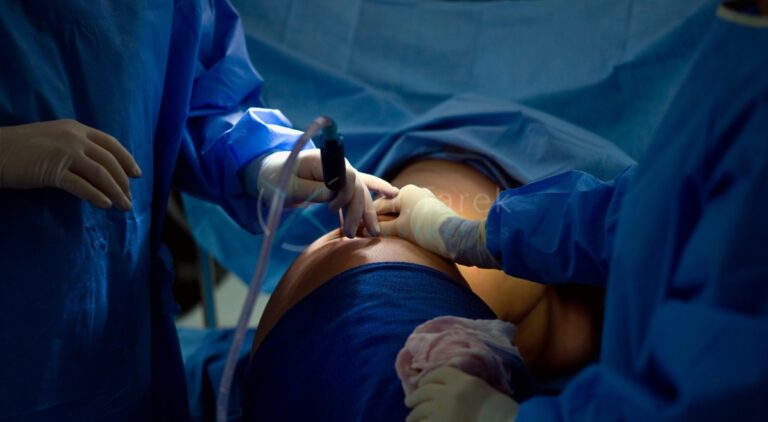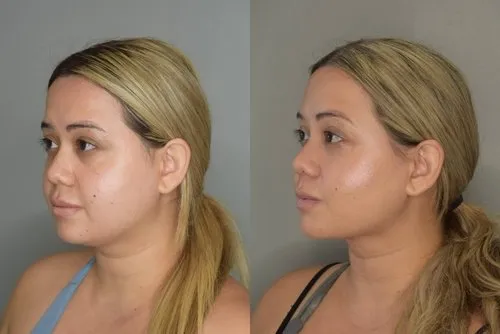Understanding the Link Between Fat Removal and Insulin Sensitivity
Liposuction, a popular cosmetic procedure, is primarily known for its ability to remove excess fat and contour the body. However, recent studies suggest that it might also have a positive impact on metabolic health, particularly insulin sensitivity. Insulin sensitivity refers to how effectively the body uses insulin to lower blood sugar levels. By removing fat, especially visceral fat, liposuction may enhance the body’s ability to respond to insulin, potentially improving blood sugar control.
Liposuction Enhances Definition by removing excess fat from specific body areas this procedure helps create a more sculpted and toned appearance revealing muscle contours
Research indicates that the reduction of fat through liposuction can lead to improved insulin sensitivity. This is particularly significant for individuals with insulin resistance, a common precursor to type 2 diabetes. By enhancing insulin sensitivity, liposuction may help in managing or even preventing diabetes.
- Liposuction targets excess fat, potentially improving insulin sensitivity.
- Enhanced insulin sensitivity can lead to better blood sugar control.
- Visceral fat reduction is crucial for metabolic health improvements.
Research Findings on Liposuction and Diabetes Risk Reduction
Several studies have explored the relationship between liposuction and diabetes risk reduction. A notable study published in the New England Journal of Medicine found that large-volume liposuction improved insulin sensitivity in obese women. This suggests that liposuction could play a role in reducing the risk of developing diabetes, particularly in individuals with a high body mass index (BMI).
The study highlights the potential of liposuction as a supplementary intervention for diabetes risk reduction. While it is not a standalone treatment, when combined with lifestyle changes, it may offer significant benefits for those at risk of diabetes.
Book A Consultation With Dr Tarek Bayazid
Top-rated Plastic Surgeon For Liposuction in Dubai
Installment Plan Available
- Large-volume liposuction has been linked to improved insulin sensitivity.
- Liposuction may reduce diabetes risk, especially in obese individuals.
- Combining liposuction with lifestyle changes enhances its effectiveness.
How Does Liposuction Affect Heart Disease Risk?
Impact of Fat Reduction on Cardiovascular Health Markers
Liposuction’s impact extends beyond aesthetics, potentially influencing cardiovascular health. By reducing fat, particularly visceral fat, liposuction may positively affect cardiovascular health markers such as cholesterol levels, blood pressure, and inflammation. These markers are crucial in assessing heart disease risk.
The reduction of visceral fat through liposuction can lead to lower levels of harmful cholesterol and improved blood pressure. This, in turn, may decrease the risk of heart disease, offering a dual benefit for individuals undergoing the procedure.
- Liposuction may improve cholesterol levels and blood pressure.
- Reduced visceral fat can lower heart disease risk.
- Cardiovascular health markers are positively influenced by fat reduction.
Long-Term Effects of Liposuction on Heart Disease Prevention
While the immediate effects of liposuction on heart disease risk are promising, understanding its long-term impact is essential. Long-term studies suggest that maintaining a healthy lifestyle post-liposuction is crucial for sustained cardiovascular benefits. Without lifestyle changes, the benefits of fat reduction may diminish over time.
Patients who combine liposuction with regular exercise and a balanced diet are more likely to experience lasting improvements in heart health. This highlights the importance of a comprehensive approach to health management.
- Long-term heart health benefits require lifestyle changes post-liposuction.
- Regular exercise and a balanced diet enhance liposuction’s effects.
- Sustained cardiovascular improvements depend on healthy habits.
Liposuction and Its Potential Role in Diabetes Management
Targeting Visceral Fat for Improved Metabolic Outcomes
Visceral fat, the fat stored around internal organs, is a significant contributor to metabolic issues, including diabetes. Liposuction’s ability to target and remove visceral fat makes it a potential tool for improving metabolic outcomes. By reducing visceral fat, liposuction may enhance insulin sensitivity and lower blood sugar levels.
The removal of visceral fat can lead to improved metabolic health, making liposuction a valuable addition to diabetes management strategies. However, it should be noted that liposuction is not a cure for diabetes but rather a supportive measure.
- Visceral fat removal can improve insulin sensitivity.
- Liposuction targets harmful fat, aiding metabolic health.
- It serves as a supportive tool in diabetes management.
Combining Liposuction with Lifestyle Changes for Optimal Results
For optimal results in diabetes management, liposuction should be combined with lifestyle changes. This includes adopting a healthy diet, engaging in regular physical activity, and maintaining a healthy weight. These lifestyle changes complement the fat reduction achieved through liposuction, leading to better metabolic outcomes.
Patients who incorporate these changes are more likely to experience sustained improvements in blood sugar control and overall health. Dr. Tarek emphasizes the importance of a holistic approach to diabetes management, combining medical interventions with lifestyle modifications.
- Lifestyle changes enhance the benefits of liposuction.
- A healthy diet and regular exercise are crucial for sustained results.
- Dr. Tarek advocates for a holistic approach to diabetes management.
What Are the Limitations of Liposuction for Diabetes Improvement?
Temporary vs. Lasting Effects on Blood Sugar Control
While liposuction can improve insulin sensitivity and blood sugar control, these effects may be temporary if not supported by lifestyle changes. The procedure itself does not address the underlying causes of diabetes, such as poor diet and lack of exercise. Therefore, without adopting healthy habits, the benefits of liposuction may diminish over time.
Patients should be aware that liposuction is not a cure for diabetes but a supplementary measure. Long-term blood sugar control requires a commitment to a healthy lifestyle.
- Liposuction’s effects on blood sugar may be temporary.
- Lifestyle changes are essential for lasting improvements.
- The procedure is a supplementary measure, not a cure.
Importance of Maintaining a Healthy Lifestyle Post-Procedure
Maintaining a healthy lifestyle post-liposuction is crucial for sustaining its benefits. This includes following a balanced diet, engaging in regular physical activity, and monitoring blood sugar levels. These habits help prevent the reaccumulation of fat and support long-term metabolic health.
Patients who commit to these lifestyle changes are more likely to experience lasting improvements in diabetes management. Dr. Tarek advises patients to view liposuction as a starting point for healthier living.
- A healthy lifestyle is crucial for sustaining liposuction benefits.
- A balanced diet and regular exercise prevent fat reaccumulation.
- Dr. Tarek encourages viewing liposuction as a starting point.
Who Is a Good Candidate for Liposuction to Address Diabetes Concerns?
Evaluating Patient Suitability and Risk Factors
Not everyone is a suitable candidate for liposuction, especially when considering diabetes concerns. Patients should undergo a thorough evaluation to assess their suitability for the procedure. Factors such as overall health, the presence of diabetes-related complications, and the amount of visceral fat should be considered.
A comprehensive evaluation helps identify patients who are likely to benefit from liposuction. Dr. Tarek emphasizes the importance of personalized assessments to ensure patient safety and optimal outcomes.
- Patient suitability depends on health and diabetes-related factors.
- Comprehensive evaluations identify suitable candidates.
- Dr. Tarek stresses personalized assessments for safety.
Consultation Process with Dr. Tarek
The consultation process with Dr. Tarek involves a detailed discussion of the patient’s health history, diabetes management goals, and expectations from liposuction. This process helps determine whether liposuction is an appropriate intervention for the patient.
During the consultation, Dr. Tarek provides personalized recommendations and discusses the potential benefits and limitations of the procedure. This ensures that patients have realistic expectations and are well-informed about their options.
- Consultations involve discussing health history and goals.
- Dr. Tarek provides personalized recommendations.
- Patients receive information on benefits and limitations.
The Role of Liposuction in Overall Health Improvement
Beyond Aesthetics: Health Benefits of Fat Reduction
Liposuction offers benefits beyond aesthetics, contributing to overall health improvement. By reducing excess fat, particularly visceral fat, liposuction can enhance metabolic health, improve cardiovascular markers, and support diabetes management. These health benefits make liposuction a valuable tool for individuals seeking to improve their overall well-being.
The procedure’s impact on health extends beyond physical appearance, offering a holistic approach to health improvement. Patients can experience enhanced quality of life and reduced risk of chronic diseases.
- Liposuction enhances metabolic health and cardiovascular markers.
- It supports diabetes management and overall well-being.
- The procedure offers a holistic approach to health improvement.
Motivational Aspects of Body Contouring for Diabetes Management
Body contouring through liposuction can serve as a motivational tool for individuals managing diabetes. The physical transformation achieved through the procedure can inspire patients to adopt healthier lifestyles and maintain their results. This motivation can lead to sustained improvements in diabetes management and overall health.
Patients who view liposuction as a starting point for healthier living are more likely to experience long-term benefits. Dr. Tarek encourages patients to use their transformation as motivation for positive lifestyle changes.
- Body contouring serves as a motivational tool for healthy living.
- Physical transformation inspires lifestyle changes.
- Dr. Tarek encourages using liposuction as motivation.
Alternative Treatments for Diabetes Management
Comparing Liposuction to Other Interventions
While liposuction offers potential benefits for diabetes management, it is not the only intervention available. Other treatments, such as medication, lifestyle changes, and bariatric surgery, also play a role in managing diabetes. Each intervention has its advantages and limitations, and the choice depends on the patient’s individual needs and health status.
Comparing liposuction to other interventions helps patients make informed decisions about their diabetes management plan. A comprehensive approach that combines multiple treatments may offer the best outcomes.
- Liposuction is one of several interventions for diabetes management.
- Other treatments include medication, lifestyle changes, and surgery.
- A comprehensive approach may offer the best outcomes.
Integrating Multiple Approaches for Comprehensive Care
For comprehensive diabetes management, integrating multiple approaches is essential. This includes combining liposuction with medication, lifestyle changes, and regular monitoring of blood sugar levels. A multidisciplinary approach ensures that all aspects of diabetes management are addressed, leading to better health outcomes.
Patients who adopt a comprehensive care plan are more likely to experience sustained improvements in their diabetes management. Dr. Tarek advocates for a holistic approach that integrates various treatments for optimal results.
- Comprehensive care involves multiple approaches to diabetes management.
- Combining liposuction with other treatments enhances outcomes.
- Dr. Tarek supports a holistic approach for optimal results.
Recovery and Post-Liposuction Care for Diabetic Patients
Special Considerations for Blood Sugar Monitoring
Diabetic patients undergoing liposuction require special considerations for blood sugar monitoring during recovery. It is essential to maintain stable blood sugar levels to promote healing and prevent complications. Patients should work closely with their healthcare team to adjust their diabetes management plan as needed.
Regular monitoring of blood sugar levels helps ensure a smooth recovery and reduces the risk of complications. Dr. Tarek emphasizes the importance of personalized care for diabetic patients during the recovery process.
- Blood sugar monitoring is crucial during liposuction recovery.
- Stable blood sugar levels promote healing and prevent complications.
- Dr. Tarek highlights the need for personalized care.
Nutrition and Exercise Guidelines After the Procedure
Following liposuction, diabetic patients should adhere to specific nutrition and exercise guidelines to support their recovery and maintain results. A balanced diet rich in nutrients and regular physical activity are essential for promoting healing and preventing the reaccumulation of fat.
Patients should work with their healthcare team to develop a personalized nutrition and exercise plan that aligns with their diabetes management goals. This approach ensures that patients maintain their results and continue to improve their overall health.
- Nutrition and exercise are crucial for post-liposuction recovery.
- A balanced diet and regular activity prevent fat reaccumulation.
- Personalized plans align with diabetes management goals.
Long-Term Outcomes of Liposuction for Diabetes Patients
Follow-Up Studies on Metabolic Improvements
Long-term follow-up studies on liposuction for diabetes patients indicate that the procedure can lead to sustained metabolic improvements when combined with lifestyle changes. These studies highlight the importance of ongoing monitoring and support to maintain the benefits of liposuction.
Patients who commit to a healthy lifestyle and regular follow-up care are more likely to experience lasting improvements in their metabolic health. Dr. Tarek emphasizes the importance of long-term follow-up for optimal outcomes.
- Long-term studies show sustained metabolic improvements.
- Ongoing monitoring and support are crucial for maintaining benefits.
- Dr. Tarek stresses the importance of follow-up care.
Maintaining Results Through Lifestyle Modifications
Maintaining the results of liposuction requires a commitment to lifestyle modifications. This includes adhering to a healthy diet, engaging in regular physical activity, and monitoring blood sugar levels. These habits help prevent the reaccumulation of fat and support long-term metabolic health.
Patients who embrace these lifestyle changes are more likely to experience lasting improvements in their diabetes management. Dr. Tarek encourages patients to view liposuction as a catalyst for positive lifestyle changes.
- Lifestyle modifications are essential for maintaining liposuction results.
- Healthy habits prevent fat reaccumulation and support metabolic health.
- Dr. Tarek advocates for using liposuction as a catalyst for change.
Insurance Coverage and Cost Considerations
Medical Necessity Criteria for Liposuction in Diabetes Treatment
Insurance coverage for liposuction in diabetes treatment depends on the medical necessity criteria. While liposuction is primarily a cosmetic procedure, it may be covered if deemed medically necessary for diabetes management. Patients should consult with their insurance provider to understand their coverage options.
Understanding the medical necessity criteria helps patients make informed decisions about their treatment options. Dr. Tarek advises patients to explore their insurance coverage and financial planning for the procedure.
- Insurance coverage depends on medical necessity criteria.
- Liposuction may be covered if necessary for diabetes management.
- Dr. Tarek recommends exploring coverage and financial planning.
Financial Planning for the Procedure and Follow-Up Care
Financial planning is essential for patients considering liposuction for diabetes management. This includes understanding the costs of the procedure, potential insurance coverage, and follow-up care expenses. Patients should work with their healthcare team to develop a financial plan that aligns with their treatment goals.
A comprehensive financial plan ensures that patients can access the care they need without financial strain. Dr. Tarek emphasizes the importance of financial planning for successful treatment outcomes.
- Financial planning is crucial for liposuction and follow-up care.
- Understanding costs and coverage helps patients plan effectively.
- Dr. Tarek highlights the importance of financial planning.179
FAQ’s
Can Liposuction Cure Diabetes?
Liposuction cannot cure diabetes. It is a cosmetic procedure that removes excess fat but does not address the underlying causes of diabetes. While it may improve insulin sensitivity and support diabetes management, it is not a standalone treatment. Patients should continue to follow their prescribed diabetes management plan, including medication, diet, and exercise.
How Much Fat Removal Is Needed to Improve Diabetes?
The amount of fat removal needed to improve diabetes varies among individuals. Factors such as the patient’s overall health, the distribution of visceral fat, and their metabolic profile play a role. A consultation with a qualified professional, like Dr. Tarek, can help determine the appropriate amount of fat removal for each patient.
Is Liposuction Safe for Diabetic Patients?
Liposuction can be safe for diabetic patients, but it requires careful consideration and planning. Patients should undergo a thorough evaluation to assess their suitability for the procedure. It is essential to work with a qualified professional who can manage potential risks and ensure patient safety throughout the process.







